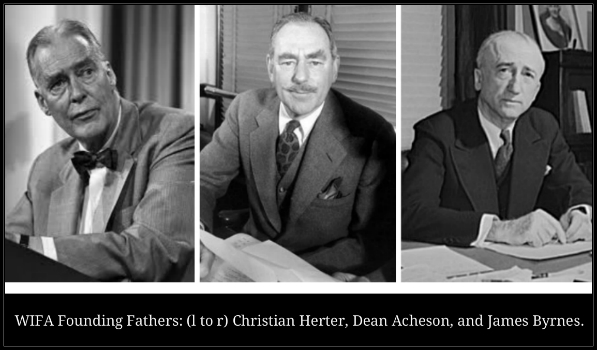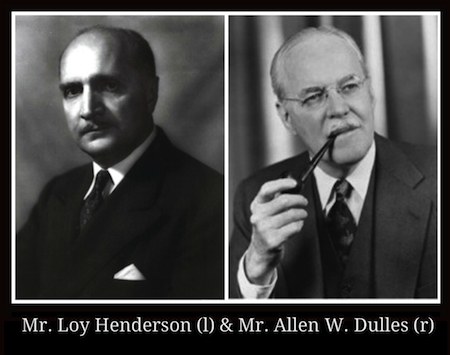The first meeting of the Washington Institute of Foreign Affairs, WIFA, was a black-tie dinner at Tillar House, held on December 12, 1961. Ambassador Loy Henderson, a distinguished career Foreign Service Officer and former Under Secretary of State, was the driving force behind the creation of the new group. He recruited three former Secretaries of State–Christian Herter, Dean Acheson, and James Byrnes—to join him as founding members and attend that first meeting. Herter, newly elected as the Institute’s Chairman, spoke on “The Priorities of the Cold War.” Allen W. Dulles, director of the Central Intelligence Agency at the time, and elected the Institute’s First Vice President, said he believed the new organization had no need to publish position papers or sponsor academic studies. Washington was awash with them. The Institute should be “dedicated to discussion and dialogue.”

Over the years, discussion and dialogue have flourished at more than 1,300 WIFA meetings. These discussions continue to be held on an off-the-record basis to encourage candor and free exchange of ideas. Throughout the 1960s and 1970s, visiting foreign leaders addressed WIFA over black-tie dinners held at the F Street Club or at afternoon discussion groups held at the 24th Street NW home of WIFA member G. Howland Chase, a Federal Reserve Bank Governor. Henderson, who served as WIFA’s long-time Chairman and President, worked with Dulles to arrange a long and illustrious list of speakers: Emperor Haile Selassie of Ethiopia, the Shah of Iran, King Hussein of Jordan, Israel’s Yitzhak Rabin, Gerhard Schroeder, Chancellor of Germany, British Prime Minister Harold Macmillan. Prince Souvanna Phouma of Laos, President Alberto Lleras Camargo of Colombia. Foreign ambassadors to the United States were—and remain—frequent and popular speakers.
American giants of foreign policy like Secretary of State Dean Rusk, Under-Secretary of State George Ball, George Kennan, Ambassador Ellsworth Bunker, General Maxwell Taylor, Henry Kissinger, William Bundy, and journalist Edward R. Murrow were among the guest speakers. In 1964, the first Annual Dinner, a festive black-tie affair that included spouses, was initiated, a tradition that continues and recently featured author/historian Lynne Olson (2016) and Army Chief of Staff General Mark A. Milley (2017) giving entertaining after-dinner talks.
Beginning in the 1990s, focus shifted to include speakers who were prominent academics, foreign policy experts, and even journalists along with the usual contingent of senior officials from the State Department, the intelligence community and U.S. military. Foreign dignitaries like Margaret Thatcher, German Chancellor Helmut Schmidt, and the president of Costa Rica, Miguel Rodriquez, were speakers. Michael Hayden, Richard Helms, and William Colby came to talk and answer questions. State Department gurus like Richard Holbrooke, Christopher Hill, and Chester Crocker have spoken, as have journalists Bob Woodward, David Ignatius, and David Sanger.
WIFA meetings are now held at the Cosmos Club. Black-tie dinners long ago morphed into more economical luncheons and afternoon discussion sessions. Membership has grown from 93 in 1961 to over 300 in 2020. And membership has broadened from a base of retired State Department officials (traditionally about 30 percent of the membership), military officers, and intelligence officials, to include journalists, bankers, lawyers, and business executives with foreign policy credentials.
